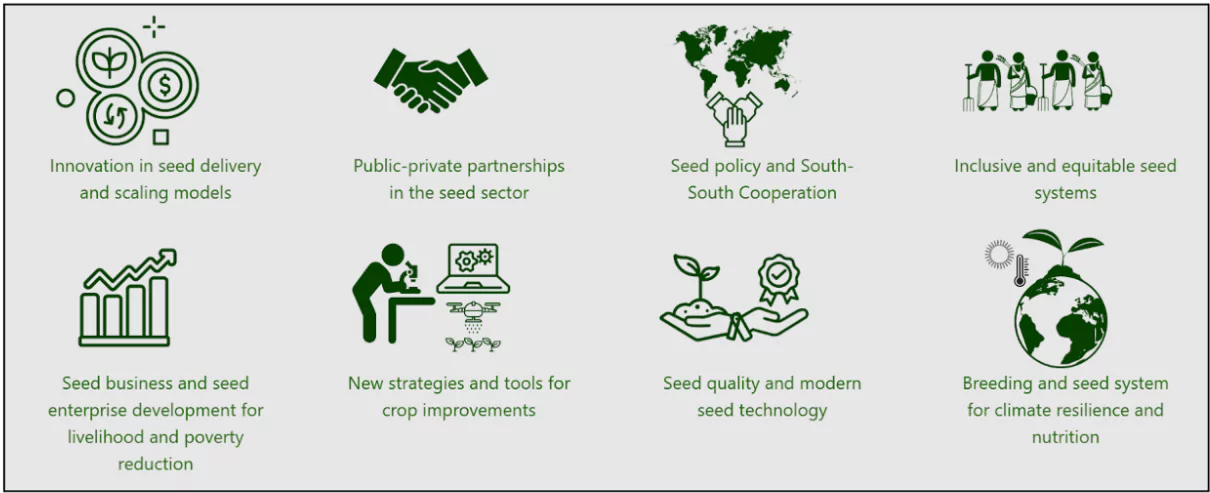The 13th edition of the National Seed Congress (NSC) concluded recently in Uttar Pradesh, bringing together over 700 participants, including scientists, policymakers, and industry leaders.
About National Seed Conference
- The National Seed Congress (NSC) is an annual event bringing together researchers, policymakers, farmers, and stakeholders from the public and private sectors.
Hybrid Crops
- Definition: Cross-breeding of two different varieties of the same species to produce offspring with desirable traits from both parents.
- Examples: Hybrid varieties of rice, wheat, maize, and cotton are widely cultivated in India such as Sonalika which is a high yielding wheat variety with disease resistance introduced in the Green revolution.
- Benefit: Increased yield, improved disease resistance, and enhanced nutritional value.
Biofortified Crops
- Definition: Crops genetically engineered to have higher levels of essential nutrients like vitamins, minerals, and micronutrients.
- Examples: Golden rice (rich in Vitamin A), iron-fortified rice and beans.
- Benefit: Improved nutritional value, reduced malnutrition, and better public health.
|
- It serves as a platform to discuss advancements in seed production, crop improvement, and delivery systems to strengthen agriculture in India and globally.
- Jointly organized by the Union Agriculture Ministry and the International Rice Research Institute (IRRI).
Enroll now for UPSC Online Course
Objectives
- Promote Innovation: Encourage research and technological advancements in seed production and crop improvement.
- Facilitate Collaboration: Strengthen public-private partnerships and regional cooperation in the seed industry.
- Enhance Farmer Empowerment: Build capacities among farmers, seed entrepreneurs, and other stakeholders.Policy Development: Deliberate on frameworks and reforms, such as a new Seeds Bill, to regulate and improve the sector.
- Sustainable Agriculture: Address global challenges like climate change, malnutrition, and food security through sustainable practices.
NSC 2024 Theme: Innovating for a Sustainable Seed Ecosystem
- Sustainable Seed Ecosystem: As per Food and Agriculture Organisation(FAO) Sustainable Seed Ecosystem ensures farmers’ access to timely, affordable, and high-quality seeds of suitable crop varieties, essential for sustainable agriculture.
- Focuses on hybrid and biofortified crops to combat malnutrition and ensure food security. Climate-Resilient Practices: Highlights the need for stress-tolerant seed varieties to adapt to climate change.
- Encourages practices like Direct Seeded Rice and zero tillage to reduce farming input costs.
- Accelerated Breeding Cycles: Focus on reducing breeding time to quickly bring innovative seeds to the market.
- Implementation of cutting-edge breeding technologies to enhance crop resilience and yield.

Policy and Partnership Recommendations
- Policy Frameworks: The need for a comprehensive New Seeds Bill to regulate the seed industry and ensure quality standards.
- Enhancing seed entrepreneurship to empower farmers as key stakeholders in seed production and distribution.
- Public-Private Partnerships (PPP): Collaboration between government bodies and private entities to promote sustainable seed production.
- Initiatives to strengthen supply chains and ensure accessibility to quality seeds.
- Developing Seed Parks: Establishment of seed parks to facilitate research, development, and large-scale production of high-quality seeds.
- Plans to make U.P. a hub for quality seed production, focusing on hybrids, biofortified crops, and vegetable seeds.
- Support for Farmers: Empowering farmers through access to better seeds to boost productivity and profitability.
- Encouraging farmer-led seed entrepreneurship to improve self-reliance and economic growth.
- Global and Local Collaboration: The Congress underscored the importance of international partnerships in addressing agricultural challenges.
- Efforts to integrate biofortified rice and hybrid seeds into existing systems reflect a step toward sustainable development.
Challenges in India’s Seed Ecosystem
- Seed Replacement Rate (SRR): SRR represents the proportion of crop area sown with certified seeds instead of farm-saved seeds.
- India’s SRR is approximately 15–20% for most crops, though it reaches 100% for hybrid seeds.
- Monoculture Farming: Extensive cultivation of Bt cotton reduces biodiversity and increases pest vulnerability.
- Seed Market Monopoly: Dominance of multinational corporations (e.g., Bayer) limits access to locally adapted seeds.
- Other Issues:
- Absence of updated legislation (e.g., pending Seed Bill).
- Insufficient promotion of seed entrepreneurship.
Check Out UPSC CSE Books From PW Store
Government Initiative to Improve Seeds Availability
- National Seed Corporation (NSC): Established in 1963, it produces foundation and certified seeds for over 600 varieties across 60 crops.
- Seeds Act, 1966: Regulates seed quality and establishes State Seed Certification Agencies.
- National Seed Policy, 2002: Emphasizes varietal development, seed quality assurance, and intellectual property protection.
- Seed Village Programme (Beej Gram Yojana): Aims to improve the quality of seeds saved by farmers.
- National Seed Reserve: Maintains reserves to ensure seed availability during climatic disruptions or emergencies.
![]() 3 Dec 2024
3 Dec 2024

